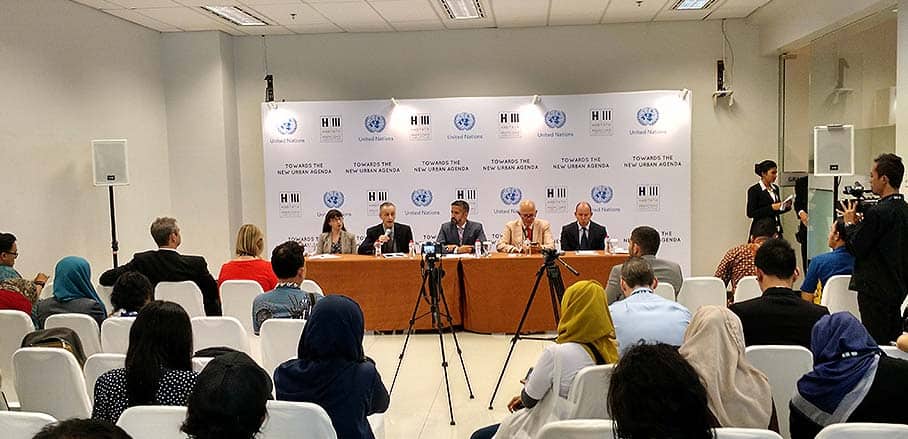PrepCom III in Surabaya: Finding a joint position on the New Urban Agenda
Surabaya, the capital of the province East Java, is the second most densely populated city in Indonesia. 63 percent of its 2.8 million inhabitants reside within Kampungs, i.e. densely populated settlement areas that occupy only 7 percent of the city’s land. Therefore, to a large extent Surabaya deals with the very urban development challenges that are discussed in the New Urban Agenda (NUA), such as the provision of decent housing and basic services for all, the creation of inclusive urban economies and the extension of public transport. All of these shall be realized against the overarching vision of green, sustainable and people-centred cities that catalyse their transformative power in order to contribute to global sustainable development.
From that perspective it is quite fitting that the third session of the Preparatory Committee of the Habitat III conference (PrepCom III) and thus the latest round of negotiations on the NUA took place in Surabaya. From July 25-27, 2016, more than 5000 government and civil society representatives from 160 countries met in Indonesia to further negotiate on how to shape urbanisation processes in the next two decades. The NUA will thus set the framework for future sustainable urban development and is scheduled to be ratified during the Habitat III conference in October 2016 in Quito, Ecuador.
Unfortunately, the negotiations did not meet the anticipated expectations in terms of finalizing the agenda’s text. Finding a joint position on how to design the institutional framework for enabling urban development and identifying a common ground on the follow-up of the New Urban Agenda and its implementation turned out to be difficult. The next step now is to resume the informal consultations in New York to reach a final draft until October, when states’ representatives and relevant stakeholders will gather for the Habitat III conference in Quito.
However, PrepCom III did not only focus on multilateral negotiations but did also offer a wide range of Side Events and opportunities for bilateral talks. The German government, which was represented by the German Ministry for Economic Cooperation and Development (BMZ) and the German Ministry of the Environment, Nature Conservation, Building and Nuclear Safety (BMUB), partnered with Cities Alliance and Oxfam International in hosting side events on implementation frameworks for the NUA and inclusive cities. In order to promote further exchange with academia, the German delegation also participated in the event „Fulfilling Habitat Commitments” that was organized by the New School University.
Coming back to Surabaya: How does the local government actually address the problem of overcrowded inner city areas? Surabaya’s urban development plan, which has been in place since the 1960s, has favoured incremental upgrading and basic service provision in close cooperation with the neighbourhoods’ elders. More recently, the city government has started a programme that encourages Kampungs’ inhabitants to engage in urban farming in order to improve their economic opportunities as well as inner city food security. Nevertheless, the city still has a long way to go. With the adoption of the New Urban Agenda, Surabaya and cities and communities around the world will hopefully gain new incentives and reinforcement to become more resilient, safe, inclusive and sustainable and help to successfully implement internationally agreed upon development agendas.
